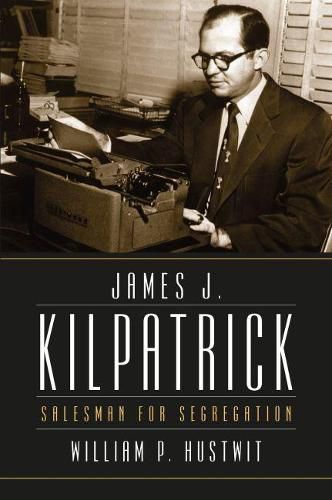Readings Newsletter
Become a Readings Member to make your shopping experience even easier.
Sign in or sign up for free!
You’re not far away from qualifying for FREE standard shipping within Australia
You’ve qualified for FREE standard shipping within Australia
The cart is loading…






James J. Kilpatrick was a nationally known television personality, journalist, and columnist whose conservative voice rang out loudly and widely through the twentieth century. As editor of the Richmond News Leader, writer for the National Review, debater in the
Point/Counterpoint
portion of CBS’s 60 Minutes, and supporter of conservative political candidates like Barry Goldwater, Kilpatrick had many platforms for his race-based brand of southern conservatism. In James J. Kilpatrick: Salesman for Segregation, William Hustwit delivers a comprehensive study of Kilpatrick’s importance to the civil rights era and explores how his protracted resistance to both desegregation and egalitarianism culminated in an enduring form of conservatism that revealed a nation’s unease with racial change.
Relying on archival sources, including Kilpatrick’s personal papers, Hustwit provides an invaluable look at what Gunnar Myrdal called the race problem in the
white mind
at the intersection of the postwar conservative and civil rights movements. Growing out of a painful family history and strongly conservative political cultures, Kilpatrick’s personal values and self-interested opportunism contributed to America’s ongoing struggles with race and reform.
$9.00 standard shipping within Australia
FREE standard shipping within Australia for orders over $100.00
Express & International shipping calculated at checkout
James J. Kilpatrick was a nationally known television personality, journalist, and columnist whose conservative voice rang out loudly and widely through the twentieth century. As editor of the Richmond News Leader, writer for the National Review, debater in the
Point/Counterpoint
portion of CBS’s 60 Minutes, and supporter of conservative political candidates like Barry Goldwater, Kilpatrick had many platforms for his race-based brand of southern conservatism. In James J. Kilpatrick: Salesman for Segregation, William Hustwit delivers a comprehensive study of Kilpatrick’s importance to the civil rights era and explores how his protracted resistance to both desegregation and egalitarianism culminated in an enduring form of conservatism that revealed a nation’s unease with racial change.
Relying on archival sources, including Kilpatrick’s personal papers, Hustwit provides an invaluable look at what Gunnar Myrdal called the race problem in the
white mind
at the intersection of the postwar conservative and civil rights movements. Growing out of a painful family history and strongly conservative political cultures, Kilpatrick’s personal values and self-interested opportunism contributed to America’s ongoing struggles with race and reform.